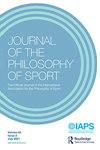Inclusion as the value of eligibility rules in sport
IF 1.7
3区 哲学
Q3 ETHICS
引用次数: 0
Abstract
ABSTRACTThis paper continues the discussion of three values of sport (safety, fairness, inclusion) that has developed around the theme of inclusion of transwomen in the female category in World Rugby, as discussed by Pike, Burke and Imbrišević. In contrast to their discussion, in which these three values have been seen from the limited perspective of the inclusion of one group of athletes into a specific category of one sport, they are here discussed in the context of the categorization in sport in general, with a focus on constitutive and eligibility rules. Constitutive rules give a strong foundation for eligibility rules. From the perspective of eligibility rules, the value of inclusion is identified as the underlying main value, while fairness and safety are its functions. This view rehabilitates the value of inclusion and has implications for how we think about the inclusion of athletes in sport, and for the creation of categories.KEYWORDS: Constitutive ruleseligibility rulescategoriestranswomeninclusionsafetyfairnessjusticepolicy AcknowledgementThis paper was written with institutional support from Charles University, Prague, Czech Republic – Cooperatio (Social Sport Sciences).Disclosure statementNo potential conflict of interest was reported by the author(s).Notes1. There are obviously other values that have been discussed with respect to the categorization of athletes, such as, for example, self-respect, recognition, cooperation and excellence (English Citation1978; Howe Citation2020; Martínková Citation2020a; Sailors Citation2014).2. These factors identify both the risk-of-danger on the side of the participant (e.g. lack of previous experience with the activity, health considerations), and also the level and quality of organisation (e.g. by whom and how the sport event is supervised), together with features of the particular environment (e.g. presence of known hazards, distance from help). All these factors contribute to the level of safety/dangerousness of the particular sport competition (Martínková and Parry Citation2017).3. However, even unisex sports may need a protected category for enabling the development of a disadvantaged group, such as female drivers (and W series) in otherwise unisex Formula 1 racing (see Howe Citation2022).4. I use the term ‘category‘ in defining the kind of category (e.g. age) and its further differentiations are called ‘subcategories’ (U17, or seniors) as in Martínková (Citation2020a, 463).5. Here I mean ‘records’ as descriptive records, simply recording the data (Parry Citation2006, 203).6. ‘Arbitrary’ is used with the following meaning: ‘ … “arbitrary” might mean that the rule could have been otherwise – i.e. whilst not just anything could count, as a rule, there is more than one candidate – and in the end, it comes down to a decision between candidates for rules which might even seem to have equal merit. We just have to decide what we want the rules of the game to be or become, and who is eligible’ (Parry and Martínková Citation2021, 1486).7. A nice example from Burke (Citation2023, 227) is of a local community basketball competition, that shows it is possible to make a competition safer and fairer through re-categorization. However, this solution is possible only if there are enough players to fill up the teams.包容作为体育运动资格规则的价值
摘要本文继续讨论派克、伯克和Imbrišević围绕将跨性别女性纳入世界橄榄球女队这一主题而发展起来的三项体育价值观(安全、公平、包容)。在他们的讨论中,这三个价值观是从将一组运动员纳入一项运动的特定类别的有限角度来看待的,而在这里,他们是在一般体育分类的背景下讨论的,重点是构成和资格规则。构成规则为资格规则奠定了坚实的基础。从资格规则的角度,确定了包容性价值是其潜在的主要价值,公平性和安全性是其功能。这一观点恢复了包容的价值,并对我们如何看待运动员在体育运动中的包容以及类别的创建产生了影响。关键词:构成规则、资格规则、类别、女性、包容性、安全、公平、正义政策。本文得到捷克共和国布拉格查尔斯大学(Charles University, Prague, Czech Republic)社会体育科学(cooperative)的机构支持。披露声明作者未报告潜在的利益冲突。关于运动员的分类,显然还讨论了其他的价值观,例如,自尊、认可、合作和卓越(英语引文1978;豪Citation2020;Martinkova Citation2020a;水手Citation2014)。2。这些因素既确定了参与者方面的危险风险(例如,缺乏先前的活动经验,健康方面的考虑),也确定了组织的水平和质量(例如,由谁以及如何监督体育赛事),以及特定环境的特征(例如,是否存在已知的危险,距离帮助的距离)。所有这些因素都有助于特定体育比赛的安全/危险水平(Martínková和Parry Citation2017)。然而,即使是男女皆可的运动也可能需要一个受保护的类别,以促进弱势群体的发展,例如在其他男女皆可的一级方程式赛车中,女性车手(和W系列)(见Howe Citation2022)。我使用术语“类别”来定义类别的类型(例如年龄),其进一步的区分称为“子类别”(U17,或老年人),如Martínková (Citation2020a, 463) 5。这里我指的“记录”是描述性记录,简单地记录数据(Parry citation2006,203)。“Arbitrary”可以有以下意思:“Arbitrary”可能意味着规则本来可以是另一种情况——也就是说,虽然不是任何东西都可以算作规则,但作为一条规则,有不止一个候选人——最终,它归结为候选人之间的决定,这些规则甚至可能具有相同的优点。我们只需要决定我们想要什么样的游戏规则,以及谁有资格”(Parry和Martínková Citation2021, 1486)。Burke举了一个很好的例子(Citation2023, 227),关于当地社区篮球比赛,这表明通过重新分类可以使比赛更安全、更公平。然而,只有当有足够的球员来填补球队时,这种解决方案才有可能实现。
本文章由计算机程序翻译,如有差异,请以英文原文为准。
求助全文
约1分钟内获得全文
求助全文
来源期刊

Journal of the Philosophy of Sport
Multiple-
CiteScore
1.90
自引率
14.30%
发文量
24
期刊介绍:
The Journal of the Philosophy of Sport (JPS) is the most respected medium for communicating contemporary philosophic thought with regard to sport. It contains stimulating articles, critical reviews of work completed, and philosophic discussions about the philosophy of sport. JPS is published twice a year for the International Association for the Philosophy of Sport; members receive it as part of their membership. To subscribe to either the print or e-version of JPS, press the Subscribe or Renew button at the top of this screen.
 求助内容:
求助内容: 应助结果提醒方式:
应助结果提醒方式:


